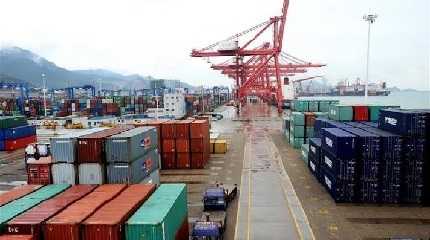
BEIJING (AP) — China’s exports rose by double digits in January and February before Russia’s attack on Ukraine roiled the global economy.
Exports grew by 16.3% over a year earlier to $544.7 billion in a sign global demand was recovering before President Vladimir Putin’s Feb. 24 invasion, customs data showed Monday. Imports advanced 15.5% to $428.7 billion despite a Chinese economic slowdown that the war threatens to worsen.
Forecasters say China and other Asian oil importers will be hurt by surging prices due to Putin’s war. China’s No. 2 leader, Premier Li Keqiang, warned Saturday global conditions are “volatile, grave and uncertain” and achieving Beijing’s economic goals will require “arduous efforts.”
Chinese authorities combine trade data for the first two months to screen out fluctuations due to the Lunar New Year holiday, which falls at different times each year in January or February. Factories shut down for up to two weeks, then restock after they reopen.
Exports to the United States rose 13.8% over a year earlier to $91.5 billion despite higher U.S. tariffs in a lingering trade war with Beijing.
President Joe Biden has yet to say what he will do about the tariffs imposed starting in 2018 by his predecessor, Donald Trump, in a fight with Beijing over Chinese technology ambitions. Trade envoys talked by phone since Biden took office in January 2021 but have yet to announce plans for face-to-face negotiations.
Imports of American goods gained 8.3% to $31.7 billion.
That was despite an abrupt slide in Chinese economic activity to 4% over a year earlier in the final quarter of 2021, compared with 8.1% for the full year, due to a crackdown on corporate debt.
Business and consumer activity also have been hurt by power shortages, disruption in supplies of processor chips and anti-coronavirus curbs that suspended access to major cities.
Li, the country’s top economic official, on Saturday announced an economic growth target of 5.5% this year, the lowest since the 1990s.
Forecasters say China and other Asian economies that need imported oil are likely to be affected by surging prices due to Russia’s attack on Ukraine.
The politically volatile trade surplus with the United States, one of the factors behind then-President Donald Trump’s decision to hike tariffs on Chinese goods in 2018, widened by 16.7% to $59.8 billion.
China’s global trade surplus rose 12.3% to $115.9 billion.




